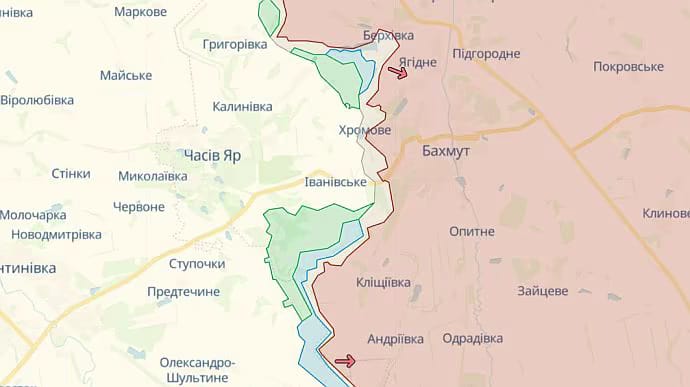Operations around Bakhmut will present Russian command with difficult choice – ISW

Specialists of the Institute for the Study of War (ISW) suggest that the Russian command may have to make difficult decisions over whether to start withdrawing forces from southern Ukraine or risk establishing significant vulnerabilities in Kherson or Luhansk Oblasts as a result of military operations surrounding Bakhmut. Source: Institute for the Study of War Details: According to the study, Russian forces are likely moving troops from other parts of Ukraine in response to Ukrainian operations around Bakhmut.
With this in mind, analysts predict: "If Russian reinforcements already sent to Bakhmut are insufficient to hold Russian gains in the area the Russian command may face difficult choices about whether to risk creating serious vulnerabilities in Kherson or Luhansk oblasts or to begin drawing forces away from southern Ukraine.."
Advertisement:The report also says that Russian sources claim that on 1 July, Ukrainian troops conducted counter-offensive operations in at least four sectors of the front. Analysts General Mark Milley, Chairman of the Joint Chiefs of Staff, acknowledged that Ukrainian counteroffensive operations would take longer than some Western observers expected. According to experts, such statements about Ukrainian operations indicate that Ukrainian troops are not currently trying to conduct large-scale operations that could lead to a rapid territorial advance.
We have launched English Twitter!
Follow us!
Meanwhile, Ukrainian officials regularly point out that the defence forces have not yet allocated a significant part of their forces for counteroffensive operations and have not yet begun the main phase of the counteroffensive. Ukrainian President Volodymyr Zelenskyy said the Russians could initiate a deliberate leak of radioactive substances at the Zaporizhzhia Nuclear Power Plant as part of a potential Russian strategy to freeze the war. Experts believe that Russia is likely to continue to use the threat of a radiological incident to deter Ukrainian counteroffensive and weaken the Western military support for Ukraine.
Russian propagandists are probably conducting an information campaign to discredit the Wagner Group in favour of integrating former PMC fighters into the structures of the Russian Ministry of Defence.
Specialists of the Institute believe that this is support for the campaign of Russian President Vladimir Putin, aimed at destroying the personal reputation of the founder of Wagner Yevgeny Prigozhin.
To quote the key ISW findings for 1 July:
- On July 1, according to Russian reports, Ukrainian soldiers engaged in counteroffensive actions in at least four frontline sectors.
- Ukrainian counteroffensive operations may take longer than anticipated, US Chairman of the Joint Chiefs of Staff General Mark Milley admitted.
- Russian officials and sources reportedly praised the defeat of small-scale Ukrainian landings on 1 July in the east (left) bank of Kherson Oblast as if it were a significant triumph.
- The Russian military command's exaggerated praise for thwarting a minor Ukrainian landing indicates either that it genuinely fears a Ukrainian attack on the east bank of Kherson Oblast, that it is desperate for an informational triumph in the wake of the Wagner Group's armed insurrection, or both.
- Russian forces are probably transferring personnel from other parts of Ukraine in response to Ukrainian operations near Bakhmut.
- According to Ukrainian President Volodymyr Zelensky, as part of a probable Russian attempt to halt the war, the Russians may trigger an intentional radioactive leak at the Zaporizhzhia Nuclear Power Plant (ZNPP).
- In support of the Russian Ministry of Defence's (MoD) initiative to disband the Wagner Group and incorporate former Wagner fighters into MoD organisations, Russian propagandists are probably running an information campaign to discredit the Wagner Group's reputation as a particularly potent fighting force.
- Along the Svatove-Kreminna line, modest offensive operations by Russian forces continued.
- Ground assaults by Ukrainian forces surrounding Bakhmut persisted.
- Russian forces kept up sporadic ground assaults and moved airborne (VDV) components to the Bakhmut region.
- Limited ground assaults by Russian soldiers proceeded along the Avdiivka-Donetsk City line.
- On the physical border between Donetsk and Zaporizhia Oblasts, Russian forces persisted in launching counterattacks on previously recovered Ukrainian positions.
- In the western Zaporizhia Oblast, Ukrainian soldiers continued their counteroffensive operations.
- Logistics from Russia to the occupied Crimea are probably being slowed down by Russian security measures on the Kerch Strait bridge.
- It's possible that Iran is delivering supplies and personnel to Russia to assist in the establishment of a plant in the Republic of Tatarstan that will allegedly produce Iranian military drones.
- Ukrainian children and adults are still being kidnapped in the occupied territory, according to reports from Western and Ukrainian sources.
Journalists fight on their own frontline. Support Ukrainska Pravda or become our patron!